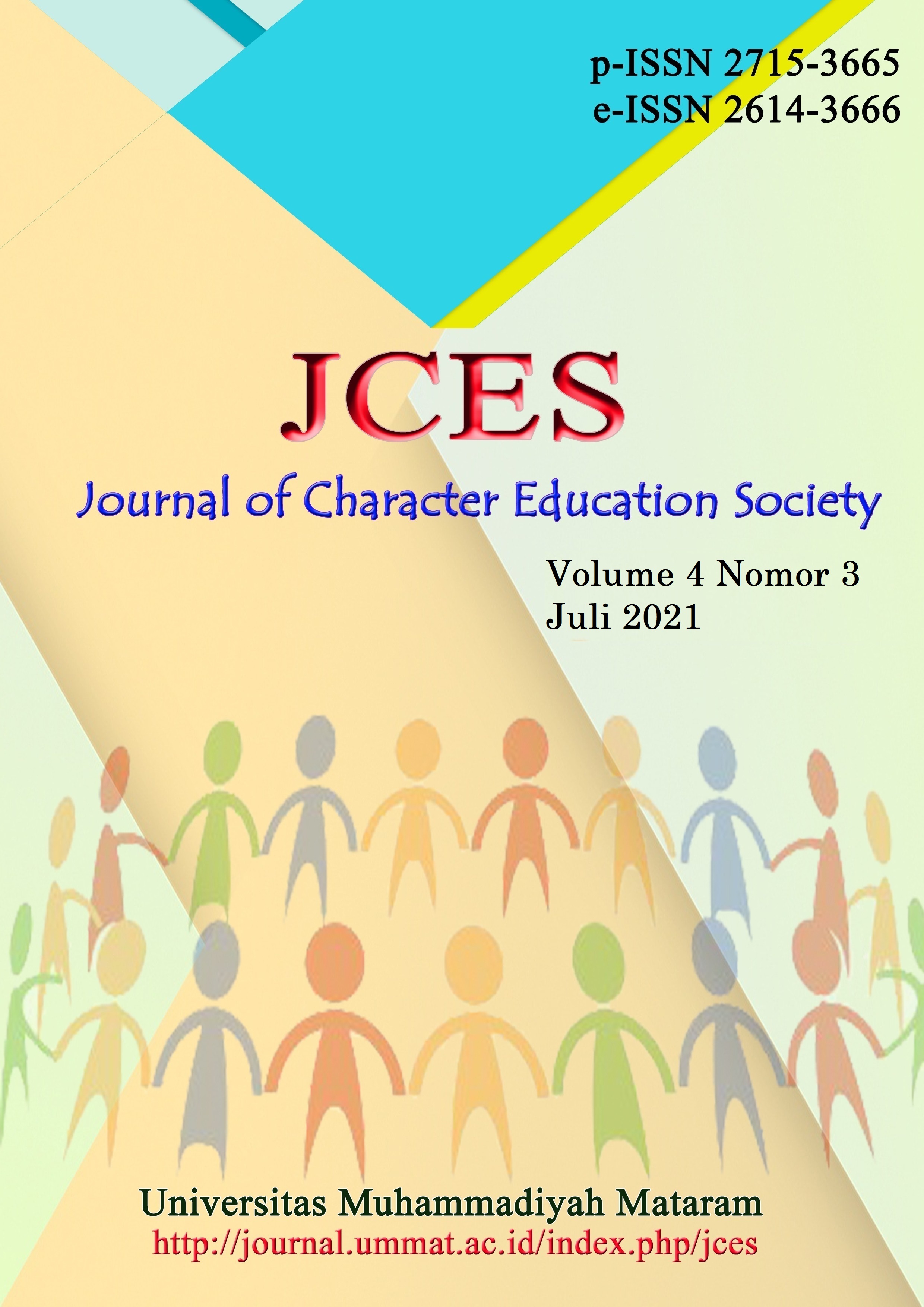GOOGLE CLASSROOM AS THE LATEST LEARNING MEDIA IN THE COVID-19 PANDEMIC PERIOD
DOI:
https://doi.org/10.31764/jces.v4i3.5654Keywords:
Covid-19, Google Classroom, Pandemik, Pembelajaran Daring.Abstract
Abstrak: Masa pandemik COVID-19 mengharuskan pembelajaran daring. Masalahnya bencana yang datang tiba-tiba menyebabkan guru-guru SD Darul Ilmi Murni kurang memiliki persiapan untuk mengatasi pembelajaran daring. Untuk itu kegiatan PKM dilaksanakan berupa workshop mengenai aplikasi Google Classroom kepada guru-guru SD Swasta Darul Ilmi Murni yang bertujuan untuk membantu guru membuat pembelajaran daring efektif dimasa pandemik COVID-19. Banyak peserta yang mengikuti kegiatan PKM ini adalah 15 orang guru dari SD Swasta Darul Ilmi Murni. Dari hasil test evaluasi praktek penerapan aplikasi Google Classroom diperoleh 85% guru berhasil membuat pembelajaran daring efektif menggunakan aplikasi google classroom. Guru-guru memiliki keterampilan untuk mengelola pembelajaran daring menggunakan Google Classroom. Prestasi siswa meningkat setelah guru menerapkan Google Classroom pada pembelajaran daring. Respon siswa, orang tua dan guru sangat baik terhadap media pembelajaran daring Google Classroom.
Abstract:Â The period of the COVID-19 pandemic requires online learning. The problem is that the sudden disaster caused the teachers of primary school Darul Ilmi Murni to be less prepared to handle online learning. For this reason, PKM activities are carried out in the form of workshops on the Google Classroom application for teachers of Darul Ilmi Murni Primary School which aims to help teachers make online learning effective during the COVID-19 pandemic. The number of participants participating in this activity was 15 teachers. From the results of the test evaluation of the practice of implementing the Google Classroom application, it was found that 85% of teachers succeeded in making online learning effective using the google classroom application. Teachers have the skills to manage online learning using Google Classroom. Student achievement increased after the teacher implemented Google Classroom in online learning. Student, parent and teacher responses are very good to Google Classroom online learning media.
References
Ali, L. U., & Zaini, M. (2020). Pemanfaatan Program Aplikasi Google Classroom Sebagai Upaya Meningkatkan Motivasi Dan Prestasi Belajar Mahasiswa Pada Perkuliahan Dasar-Dasar Kependidikan. Society, 11(1), 27–34. https://doi.org/10.20414/society.v11i1.2297
Asmuni, A. (2020). Problematika Pembelajaran Daring di Masa Pandemi Covid-19 dan Solusi Pemecahannya. Jurnal Paedagogy, 7(4), 281. https://doi.org/10.33394/jp.v7i4.2941
Asnur, M. N. A., Adhima, F., Ayuwijayanti, M., & Marsuki, R. R. (2019). Karaketristik Pembelajaran Kolaboratif Bahasa Asing dalam Google Classroom. Prosiding Seminar Nasional Literasi Bahasa Dan Sastra Ke-4 Pembelajaran Bahasa Asing Di Era Digital, 1–11. http://sipeg.unj.ac.id/repository/upload/artikel/ARTIKEL_SPROSIDING_SEMINAR_NASIONAL.pdf
Ayuni, D., Marini, T., Fauziddin, M., & Pahrul, Y. (2020). Kesiapan Guru TK Menghadapi Pembelajaran Daring Masa Pandemi Covid-19. Jurnal Obsesi : Jurnal Pendidikan Anak Usia Dini, 5(1), 414. https://doi.org/10.31004/obsesi.v5i1.579
Bagas Panca Pradana, D. (2017). Pengaruh Penerapan Tools Google Classroom pada Model Pembelajaran Project Based Learning terhadap Hasil Belajar Siswa. It-Edu, 2(01).
Dhanalakshmi, R., Anuja Mary, A., Shrijith, D., & Vijayaraghavan, N. (2021). A Study on Covid-19 – Impacting Indian Education. Materials Today: Proceedings, xxxx. https://doi.org/10.1016/j.matpr.2021.02.786
Endah Wulantina, S. M. (2019). Persepsi Peserta Didik terhadap Metode Blended Learning dengan Google Classroom. Jurnal Inovasi Matematika, 1(2), 110–121. https://doi.org/10.35438/inomatika.v1i2.156
Fadista, J., Kraven, L. M., Karjalainen, J., Andrews, S. J., Geller, F., Baillie, J. K., Wain, L. V., Jenkins, R. G., & Feenstra, B. (2021). Shared genetic etiology between idiopathic pulmonary fibrosis and COVID-19 severity. EBioMedicine, 65, 103277. https://doi.org/10.1016/j.ebiom.2021.103277
Firyal, R. A. (2020). Pembelajaran Daring dan Kebijakan New Normal Pemerintah. LawArXiv Papers, 1–7. https://osf.io/preprints/lawarxiv/yt6qs/
Handarini, O. I., & Wulandari, S. S. (2020). Pembelajaran daring sebagai upaya study from home (SFH) selama pandemi covid-19. Jurnal Pendidikan Administrasi Perkantoran (JPAP), 8(3), 496–503. https://doi.org/10.1093/fampra/cmy005
Mayasari, F., Dwita, D., Jupendri, J., Jayus, J., Nazhifah, N., Hanafi, K., & Putra, N. M. (2019). Pelatihan Komunikasi Efektif Media Pembelajaran Google Classroom Bagi Guru Man 2 Model Pekanbaru. Jurnal Pengabdian UntukMu NegeRI, 3(1), 18–23. https://doi.org/10.37859/jpumri.v3i1.1155
Nadziroh, F. (2017). Analisa efektifitas sistem pembelajaran berbasis e-learning. Jurnal Ilmu Komputer Dan Desain Komunikasi Visual (Jikdiskomvis), 2(1), 1–14.
Naserly, M. K. (2020). Implementasi Zoom, Google Classroom, Dan Whatsapp Group Dalam Mendukung Pembelajaran Daring (Online) Pada Mata Kuliah Bahasa Inggris Lanjut. Journal of Chemical Information and Modeling, 4(2), 155–165. https://jurnal-dikpora.jogjaprov.go.id/index.php/jurnalideguru/article/view/129
Ramadhani, R., Bina, N. S., Sihotang, S. F., Narpila, S. D., & Mazaly, M. R. (2020). Students’ critical mathematical thinking abilities through flip-problem based learning model based on LMS-google classroom. Journal of Physics: Conference Series, 1657(1). https://doi.org/10.1088/1742-6596/1657/1/012025
Sutrisna, D. (2018). Meningkatkan Kemampuan Literasi Mahasiswa Menggunakan Google Classroom. FON : Jurnal Pendidikan Bahasa Dan Sastra Indonesia, 13(2), 69–78. https://doi.org/10.25134/fjpbsi.v13i2.1544
Downloads
Published
Issue
Section
License
Authors who publish articles in JCES (Journal of Character Education Society) agree to the following terms:
- Authors retain copyright of the article and grant the journal right of first publication with the work simultaneously licensed under a CC-BY-SA or The Creative Commons Attribution–ShareAlike License.
- Authors are able to enter into separate, additional contractual arrangements for the non-exclusive distribution of the journal's published version of the work (e.g., post it to an institutional repository or publish it in a book), with an acknowledgment of its initial publication in this journal.
- Authors are permitted and encouraged to post their work online (e.g., in institutional repositories or on their website) prior to and during the submission process, as it can lead to productive exchanges, as well as earlier and greater citation of published work (See The Effect of Open Access).

